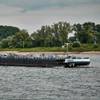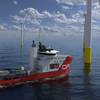Round Table Agrees on Somalia Piracy Approach
At the invitation of IMO Secretary-General Efthimios E. Mitropoulos, a meeting took place involving the heads of the four shipping industry bodies known collectively as the Round Table (BIMCO, ICS/ISF, INTERCARGO and INTERTANKO), and of the International Transport Workers’ Federation (ITF). The meeting aimed at exploring common approaches, additional to measures already taken, to address the increasingly serious incidence of piracy attacks on shipping off the coast of Somalia and, in particular, in the Gulf of Aden – a strategic corridor leading to the Red Sea and to the Suez Canal, which represents a key conduit for almost 12 percent of the world’s crude oil, not to mention other energy, container and general bulk traffic.
In the face of the recent alarming deterioration of the situation – both in the number of attacks, hijackings and hostage takings off Somalia, and the ferocity with which they are carried out – and in the light of some 13 vessels and over 200 seafarers reportedly now in the hands of pirates, the meeting, which took place at IMO Headquarters, identified a number of key issues that it felt needed to be addressed in order to alleviate the situation and strengthen further the safeguarding of shipping, including fishing vessels and pleasure craft, in the region.
The meeting called for sustained coordination between all naval forces operating in the area currently and in the future; for clear rules of engagement that would enable military assets to intervene effectively to protect shipping; and for an extension, for an adequate duration, of the mandate given in United Nations Security Council resolution 1816 (2008) enabling States co-operating with the Transitional Federal Government of Somalia to enter the country’s territorial waters and use all necessary means in order to repress acts of piracy and armed robbery at sea, consistent with relevant international law. That mandate is due to expire on 1 December 2008, i.e. six months after the adoption of the resolution on June 2, 2008.
The meeting agreed on a number of specific measures to be taken by the IMO Secretary-General and the participating organizations, individually and collectively, to mobilize support and action from all sides in a position to assist.
The meeting further agreed that the need for any such measures was becoming increasingly urgent because of the immediate human concerns for the safety and wellbeing of seafarers and passengers who are currently being held hostage or may be caught up in future attacks; the continuing impact of the situation on the viability of transporting much-needed humanitarian assistance to Somalia; and its potential and significant detrimental effect on the world’s commerce.
It was considered that, without adequate and coordinated protection for shipping, the current situation off Somalia might cause ship operators to avoid transiting through the Gulf of Aden, using the Cape of Good Hope instead, which would lead to increased shipping costs and, in turn, possible negative consequences for global trade – and, in the final analysis, the consumer – at a time when all nations are making efforts to address the current global financial crisis.
In this respect, the meeting was encouraged by the UN Security Council’s adoption, on October 7, 2008, of resolution 1838 (2008), which calls upon States interested in the security of maritime activities to deploy naval vessels and military aircraft to actively fight piracy off the coast of Somalia, and expresses the Council’s intention to remain seized of the matter with a view, in particular, to renewing the mandate granted in its earlier resolution 1816.













